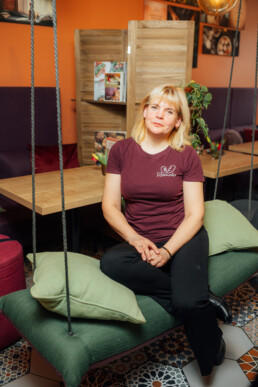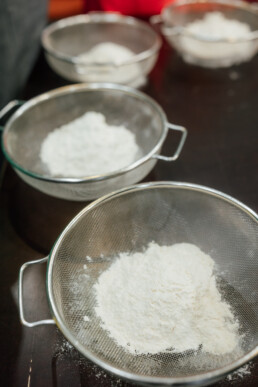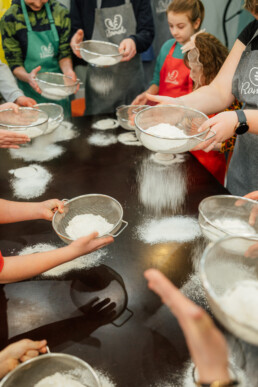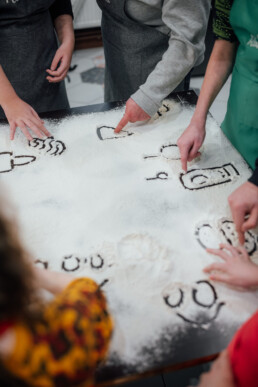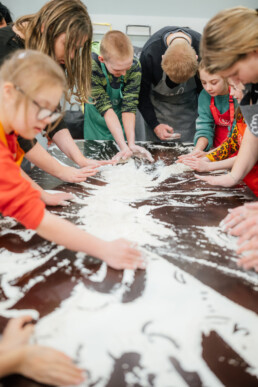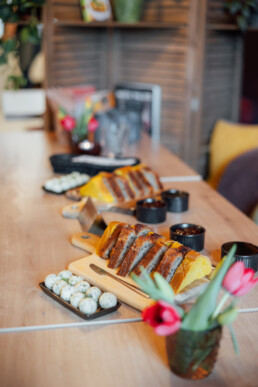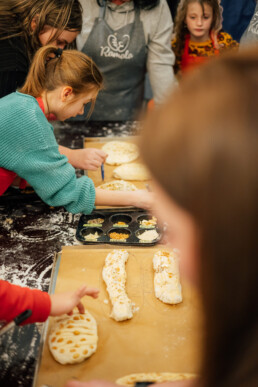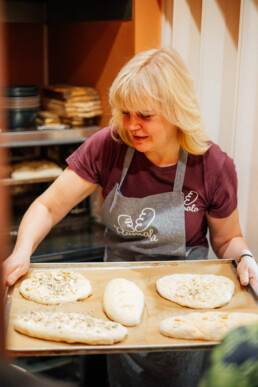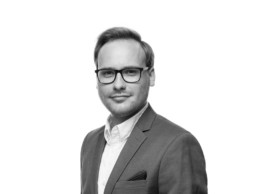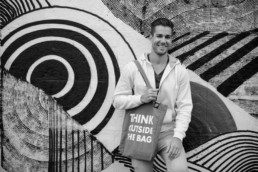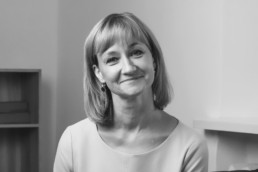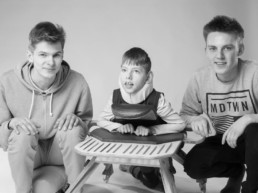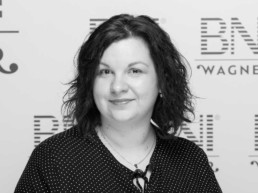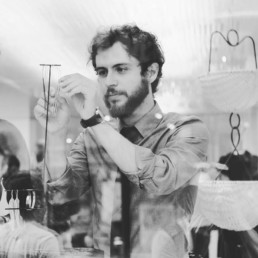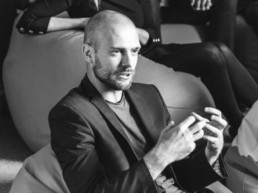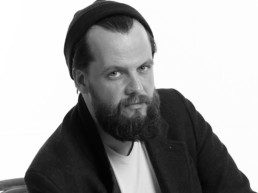Creative Bread Laboratory “RaMaLa”
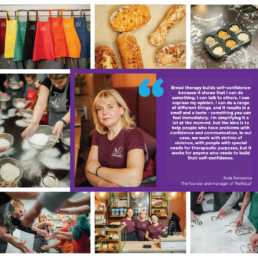
Creative Bread Laboratory “RaMaLa”, Ventspils
Innovative social rehabilitation service – bread therapy for victims of violence and people with special needs; café and catering services.
Lielais prospekts 48, Ventspils, LV-3601
+371 26480162
The social enterprise “RaMaLa” has brought to Latvia a perhaps less familiar form of therapy – Bread Therapy. It is a method of working that helps different people to create an atmosphere of trust and a feeling of home by baking and sharing bread together. It is also another way to help victims of violence, people with special needs or simply those who need to build their self-confidence and realise their worth.
“These values are very important in today’s society – the opportunity to be heard, to be appreciated, which is disappearing in today’s age of haste and stress, and people feel lonely, it is perhaps more difficult for them to get along with others, to prove themselves,” says Ruta Šenkevica, the owner of the Creative Bread Laboratory.
The idea comes from the “Bread House” in Bulgaria and was inspired by research on how people in different communities in different parts of the world use their time to cook together. It’s a wonderful way to bring people together and unite them, as everyone involved in the process becomes more open and honest. “RaMaLa” in Ventspils is now a full member of Bakers Without Borders, a network that works with this form of therapy all over the world.
“On an exchange visit to Bulgaria, together with the specialists of the crisis centre “Paspārne”, we discovered this form of therapy. It has very good results, and it’s here and now, because from the very first session, the person is very satisfied with what they have done and how they have done,” says Ruta. “Bread therapy builds self-confidence because it shows that I can do something, I can talk to others, I can express my opinion, I can do a range of different things, and it results in a smell and a taste – something you can feel immediately. I’m simplifying it a lot at the moment, but the idea is to help people who have problems with confidence and communication. In our case, we work with victims of violence, with people with special needs for therapeutic purposes, but it works for anyone who needs to build their self-confidence.”
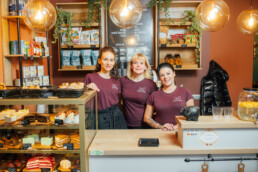
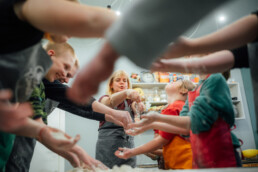
The method is also integrated into leisure activities for both children and adults. This generates income, which allows bread therapy to be provided free of charge to the target groups. Eight such free sessions can be provided per month – there is no possibility of offering more, as there is dedicated time for paid events that can cover the costs. The free groups are for both adults and children and are run by two organisations: the crisis centre “Paspārne”, which is also the founder of the social enterprise “RaMaLa” and helps victims of violence, and the day centre for people with special needs “Cimdiņš”.
“There are also special cases. For example, if a mum calls and says she wants to organise a birthday party for her child who has special needs, we always find a way to offer discounts, and there are discounts for independent clients too. We are very flexible – if it’s a client from our target group, then we give them the service on a slightly different basis,” explains Ruta.
In Bulgaria, this type of therapy works a lot with Syrian refugees, also with Romanians, with Roma people. “We saw how well it all worked, but we knew there was no money, because you also need the material basis for it, not just the knowledge. But we went, we studied, we took exams – it’s not that easy. Back in Latvia, we were looking for ways to implement this type of therapy service, and that was when the first support programme for social entrepreneurship opened, when we could apply for Altum grants. At that time we hadn’t yet set up a limited liability company, we had a crisis centre through which we applied for a grant. We were able to start our activity thanks to the grant of the crisis centre. We got funding for a year. We looked at the premises, renovated them so that we could also do business. Then, with the next grant, we set up a company, and we have been working as a limited liability company since 2020″, Ruta recalls the journey to the company that is working well today.
They are looking for staff with a background in pastry and cooking, but the classes are run by one person – Ruta herself, who is trained and qualified to do so. So, in principle, there are two different parts to the business. One is simply catering, the other is everything that goes on in the classroom, where there are therapeutic classes, entertainment workshops, bonding events and everything else that can be done to earn money to realise the social aims of the company. “RaMaLa” employs eight people at the moment, with additional staff in the summer season.
“We received our first grant as a work integration social enterprise. The employees were those who needed it – women who were long-term unemployed, Roma women. Not only did they learn how to bake the perfect cakes that everybody loves, but now they are working in other jobs. They have learnt what discipline is, what professional relations are, and so on. The fact that you see the results is probably what motivates you to keep going,” says Ruta.
“RaMaLa” could also compete as a regular café – the quality is good, customers have recognised it. There are companies that deliberately choose the services of this place year after year for its social purpose. But no one is resting on their achievements – various innovative ideas are also being brought to life. For example, we offer also cakes for pets.
“We had a little chef school for children and they expressed that they wanted to learn how to cook treats for their pets. So, we made cakes and biscuits for the dogs and cats, and the Ventspils Canisterapy team came and tested the treats. It is true that those who are working with people from difficult situations, all the closest partners are from different alternative therapies, methods e.g. canister therapy, reitherapy, pedagogical riding – we bring in as many different resources as possible to get a positive result in these rehabilitation services. Dogs are also one of our partners, hence these cakes for dogs,” says Ruta with a laugh.
The plans for the future are also clear – documents are being prepared and everything is being sorted out to create a franchise and bring this type of place to other cities. “There are already plans, business partners who are ready to try something in Riga. We have the ideas, but we lack the funding at the moment, so we are waiting for the support programme to be able to go all the way,” says Ruta. If “RaMaLa” becomes a success in Riga, then perhaps other cities could be considered.
“Both the association (crisis centre) and the social enterprise are my creation, they are my ‘children’, and I see the good sides when both of these places work well. You can bring so much positivity to people! At the end of the session, there is a moment when they take the towels off the covered bread… You can’t describe it – the feeling, the energy that comes when the children see that they have done so well, that everything smells like warm bread! I guess that’s what motivates me – that moment,” says Ruta Šenkevica.
Initially, Ruta set up a crisis centre because there was no such thing in Ventspils – people could not get all the help they needed in one place. “I used to work for a human rights support network that was active all over Latvia. The programme was coordinated by Rūta Dimanta and the NGO Centre in Riga. Together with Rūta and other people from different regions, we created this network and talked about everyone’s rights and what they were entitled to. It was a crazy time twenty years ago – resources in Latvia were very scarce and NGOs were the ones who could give people hope and support. At that time, the idea came up that there should be a crisis centre in Ventspils. Through this support programme I helped young mothers who, for example, had nowhere to live because they had a violent husband who was chasing them out of the house. That’s how it all came together and the crisis centre was created,” Ruta recalls the beginning of her work. Gradually it became clear that more needed to be done, because the crisis centre was selling a service to the state, and the state was not prepared to pay for a broad basket of services. Trying to find more money led to this business idea.

